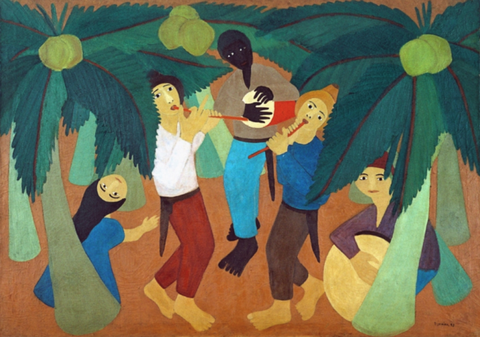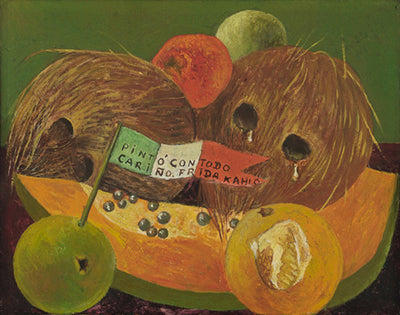Fragrance has a magical ability to transport our mind to different places and evoke a wide range of emotions. When it comes to sunlit summer memories and a tropical mood of sandy beaches and swaying palm trees, one scent stands out - coconut.
Coconuts are the fruit of the coconut palm (Cocos nucifera), a tree belonging to the Arecaceae family. It sometimes called “the tree of life” because all of its parts from the roots to the fruit can be utilized. Coconuts are believed to have originated in the tropics of South Africa, South America, and the Ganges delta. An Arab proverb epitomizes the coconut’s usefulness:
“If humans were to appear on the Earth with no more than a coconut palm,
they could live quite happily and contented for all eternity.”

The Spiritual Properties of Coconuts
Coconut holds special significance in various spiritual traditions around the world, most often concerning matters of spiritual cleansing, fertility, and protection. Here are a few of the many ways that humans and coconuts engage in spiritual relationship with each other:
-
Purity and Cleansing: In Hinduism and Buddhism, coconuts are offered during rituals and ceremonies as a symbol of purity and divine blessing. Breaking a coconut is used to purify the environment and remove negative energies.
-
Protection: In many cultures and religious communities, coconut shells are used as vehicles for talismans or protective charms. When prepared properly, these are used to ward off bad intentions and evil spirits and provide a shield of protection for individuals and/or their homes.
-
Fertility and Abundance: Coconuts are often associated with fertility and abundance. People seeking these are often encouraged to ritually consume and/or bathe in coconut milk. Coconuts are also used in fertility rituals or placed in homes to attract prosperity and good fortune.
-
Offerings: Coconuts are often used as offerings in religious ceremonies and rituals in Hinduism and other religions. Coconuts are ritually presented to deities as an act of devotion and gratitude.
-
Cleansing Rituals: In some spiritual practices, coconut water is used in purification and cleansing rituals to wash away negativity and promote spiritual harmony.
-
Energy and Vitality: Coconut's nourishing properties are believed to enhance one's physical and spiritual vitality. It is sometimes consumed or applied topically as a mind-body-spirit 'energy booster.'
-
Divination: In some cultures and religious communities, coconut shells are used for divination or fortune-telling. The cracks and patterns on a coconut's shell are interpreted to gain insights into future events or to receive guidance.

The Scent Profile of Coconut Perfumes
The source of coconut's unique aroma derives mostly from its pulp (white lining) and water, which is the liquid inside the coconut. Described by perfumers as sweet, creamy, and slightly nutty, the scent of coconut conjures images of sun-kissed skin, relaxed vacations, and the soothing sound of ocean waves. The familiar scent of coconut is primarily composed of lactones, which are responsible for its creamy and tropical notes. Coconut perfumes emphasize different parts of the coconut:
-
Coconut Water: Coconut water perfumes capture the aquatically refreshing and slightly sweet aroma of young green coconuts. Sea Girl is a light, airy coconut water perfume with beachy ozone, warm skin musk, wild jasmine, sugar cane, double pearl tuberose, and clean white patchouli. This Summer Night is a more complex tropical perfume that brings together coconut water and young coconut with luscious tropical fruits, plumeria, pua kenikeni, cherimoya, lychee blossoms, rhubarb, white florals, and warm summer musk.
-
Coconut Milk: Coconut milk perfumes have the creamy and sweet profile of the inside of a very ripe coconut. The scent of coconut milk is what most people associate with coconut and tropical-themed perfumes. Aurora blends creamy cardamon infused coconut milk with soft cashmeran, orris root, white amber, white musk, white violet, white ginger, lotus flower, and a touch of honeyed cream.
-
Coconut Flesh: Perfumes with coconut flesh elements emphasize the woodier aspects of mature coconuts along with the sweet and nutty scent freshly grated coconut meat. Coconut flesh is a more complex coconut scent that adds a warm woody depth to perfumes and blends beautifully with resins, musks, and ambers. Our perfumes with coconut flesh notes include: Infamous Muse, Basier du Soleil, and As Dark Things Are Meant to be Loved.
- Young Coconut: Similar to coconut water perfumes, but slightly more milky and fruity, perfumes with young coconut elements have an almost custardy sweetness while still remaining delicate and light. Paradise perfume showcases the simple beauty of fresh young coconut and Madagascar vanilla with hints of Monoi Tiare.
Conclusion
The allure of coconut encompasses a wide range of human experiences - from the sweet escape of relaxing in the sunshine on a sandy beach to acting as a ritual conduit for cleansing and devotion, the coconut holds a unique and sacred place in the hearts of many people worldwide reminding us of the profound connections between nature, spirituality, and the human experience.

Artworks:
- Under a coconut palm tree by Winslow Homer, 1898
- Still Life with Coconuts by Francisco Oller, 1893
- Weeping Coconuts by Frida Kahlo, 1951

